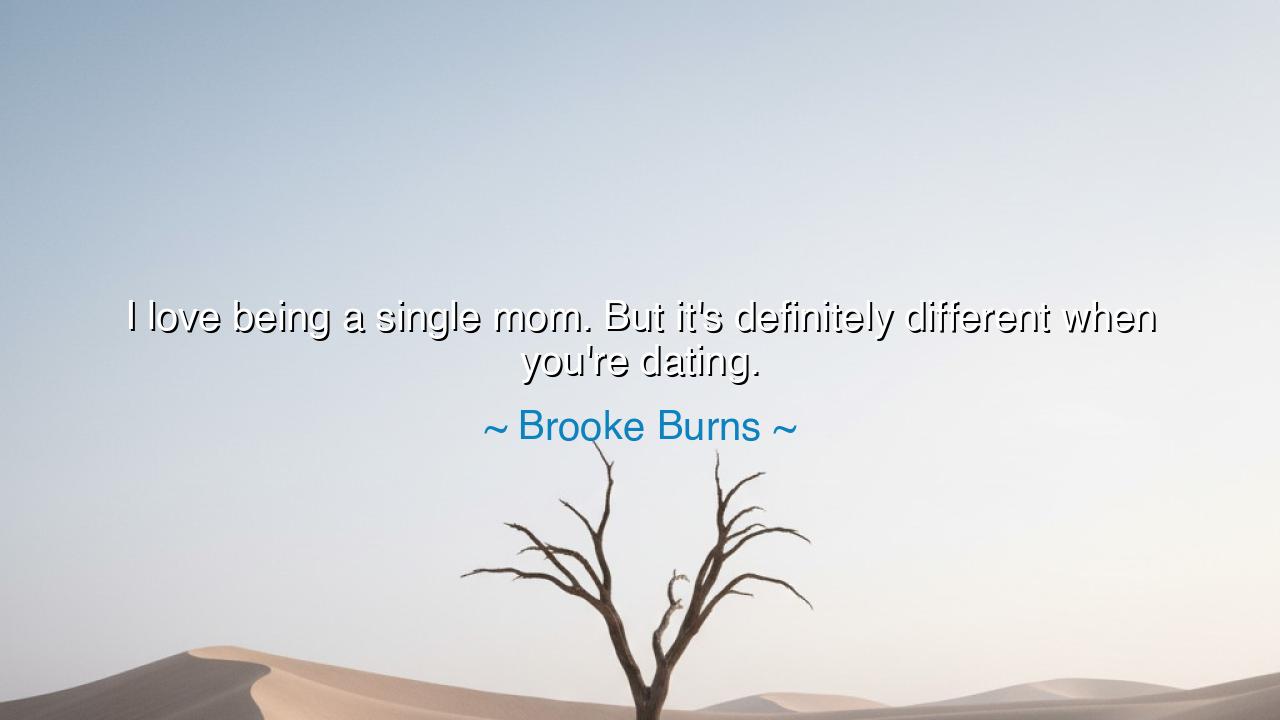
I love being a single mom. But it's definitely different when






There are words that speak quietly yet carry the weight of two worlds — the world of love and duty, of the heart that nurtures and the heart that hopes. Such are the words of Brooke Burns, who said: “I love being a single mom. But it’s definitely different when you’re dating.” In these few simple phrases lies the eternal tension between devotion and desire, between the role of the mother and the role of the woman. Her words are not a complaint, but a confession of the human heart’s complexity — a truth as ancient as time: that one soul can carry many callings, and each must be tended with both strength and grace.
To say, “I love being a single mom,” is to affirm a kind of sacred independence — the love that protects, provides, and perseveres without the constant presence of another. It is the voice of a woman who has built a world for her child with her own hands, who knows the sleepless nights, the silent fears, and the fierce pride that only single parenthood can bring. Yet within that declaration of love lies also an awareness of solitude. The single mother is both warrior and healer; she stands where two once stood, bearing double the responsibility but also double the strength. Hers is not a life of lack, but of resilience — a reminder that love’s truest form often appears not in romance, but in the quiet courage of raising life itself.
But when Brooke Burns adds, “It’s definitely different when you’re dating,” she reveals a tender struggle — not of weakness, but of balance. To date as a single mother is not to return to the carefree dance of youth; it is to step once more into the realm of vulnerability, but now with the wisdom of experience and the responsibility of another life watching. The heart must open, yet remain guarded. The woman must feel, yet also protect. Love, once simple, now requires discernment, patience, and foresight — for she no longer chooses only for herself, but for the child whose world she has built.
In the ancient tales, such duality was honored. The Greeks spoke of Demeter, the goddess of harvest and motherhood, who poured all her love into her daughter Persephone, yet still longed for renewal and joy. When Persephone was taken into the underworld, Demeter’s grief turned the earth barren — but when mother and daughter were reunited, spring returned. So it is with the single mother: her love nourishes the world around her, but she too must tend to her own heart, lest the garden of her spirit grow dry. To date, to seek companionship again, is not betrayal — it is the reclaiming of balance, the awakening of her own spring after a long winter of duty.
There is also in Burns’ words a profound humility — the recognition that love changes after motherhood. Once, love may have been a rush of feeling, a flight of freedom; now, it is a quiet negotiation between affection and accountability. The single mother sees through illusion; she has walked through heartbreak and learned that the truest partner is not the one who dazzles the eye, but the one who honors her dual world — who respects her devotion as a mother and celebrates her as a woman. Such love requires patience from all sides, for it asks the suitor to understand that in her life, love no longer stands alone — it walks hand in hand with responsibility.
Throughout history, there have been women who embodied this dual path. Think of Cleopatra, who was not only queen but mother — who ruled nations while raising her children amid empire and turmoil. Or of Eleanor of Aquitaine, who carried both crown and motherhood, shaping kings even as she navigated the politics of love and legacy. Their lives, like Burns’ words, remind us that womanhood is not one shape but many — that strength and tenderness are not opposites, but companions. To love as a mother and to love as a woman are not separate journeys, but two branches growing from the same tree of life.
The lesson, then, is clear and luminous: to embrace all parts of the self is the highest act of love. Do not believe that motherhood must silence womanhood, or that duty must erase desire. Life, like the seasons, asks us to honor every role we inhabit — to give wholly where we are planted, yet never forget that the soul too must bloom. If you are a mother, let yourself love again, not in spite of your role, but because of it — for the child who sees you whole will learn what wholeness truly is.
So let the wisdom of Brooke Burns stand as a quiet flame for all who walk this path: love your children fiercely, and love yourself bravely. Guard your home, but do not close its door to joy. Remember that balance is not a burden but a blessing — the sign of a heart that has endured, and still dares to hope. For when a woman learns to honor both the mother and the lover within her, she becomes what the ancients called complete — not divided, but divine.






AAdministratorAdministrator
Welcome, honored guests. Please leave a comment, we will respond soon